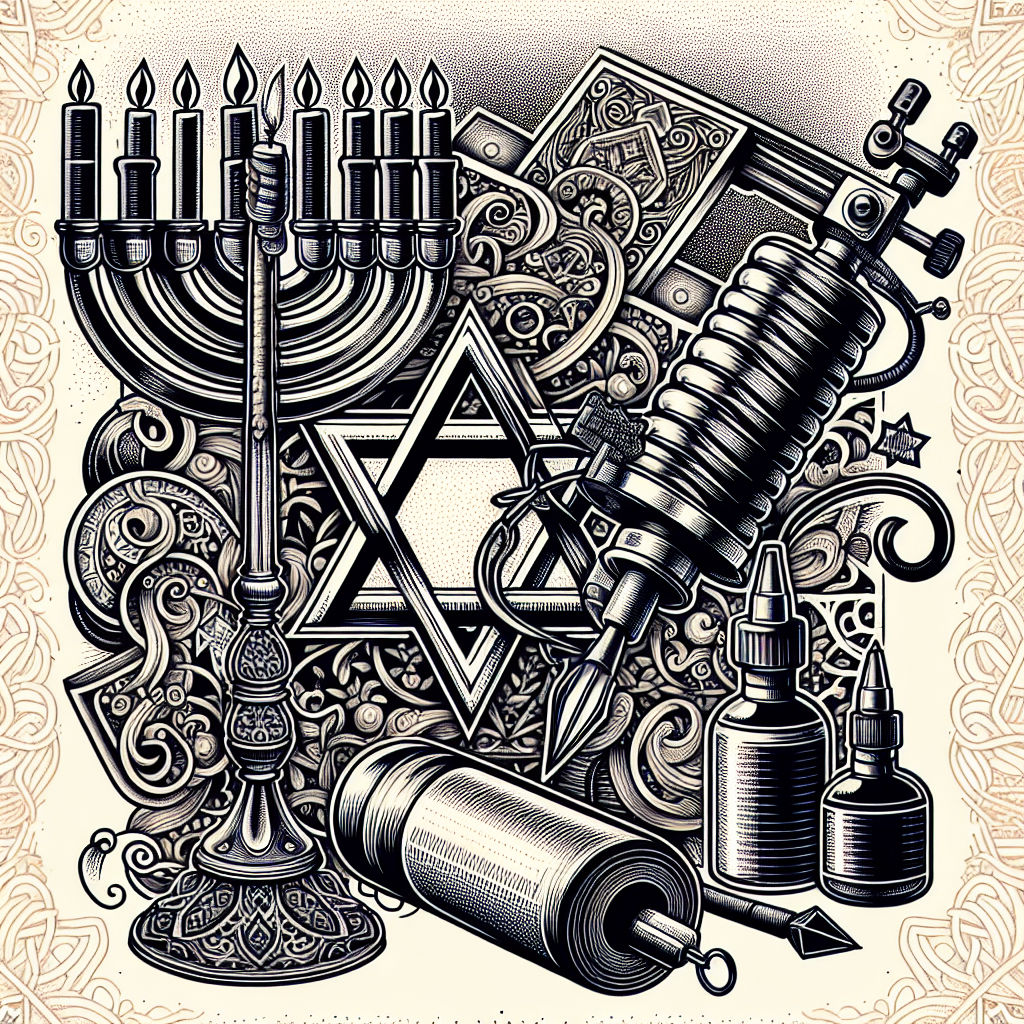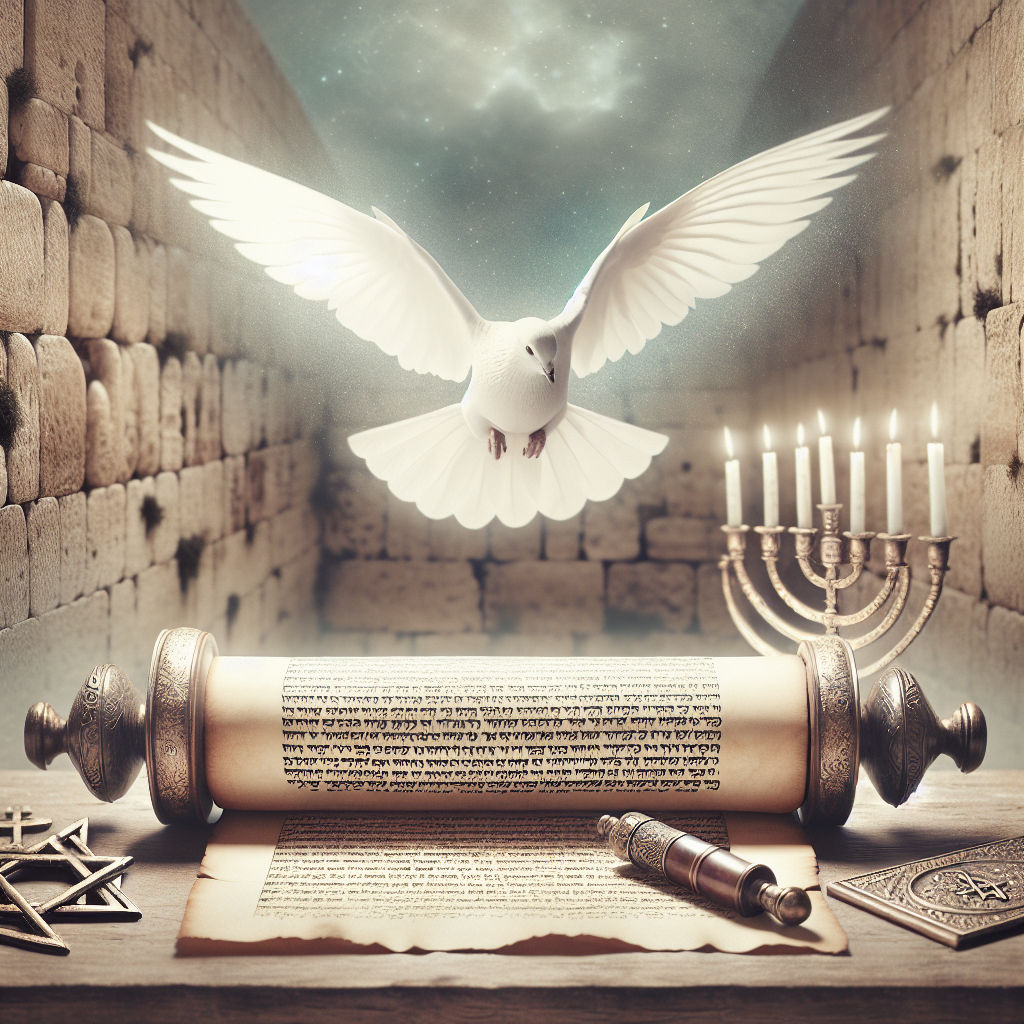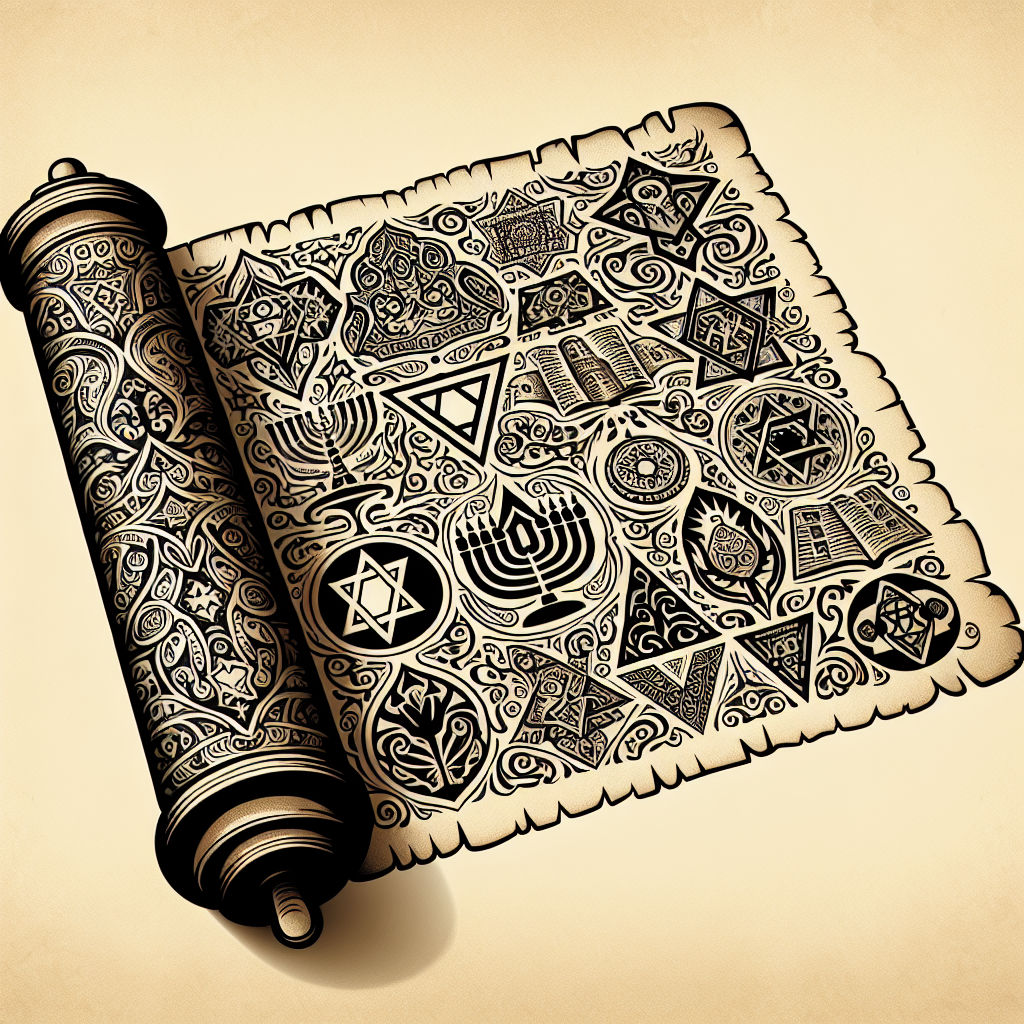“How to Choose a Jewish Tattoo: Tips and Advice”
Introduction to Jewish Tattoos
Tattoos have been a form of self-expression for thousands of years, and their significance varies across cultures and time periods. In Jewish culture, the history of tattoos is complex and often fraught with tension. Historically, tattoos have been taboo in Jewish communities, largely due to religious prohibitions. However, in modern times, there has been a growing debate within the Jewish community regarding the acceptability of tattoos.
The roots of this debate can be traced back to the Torah, where the text is often interpreted as forbidding tattoos. Despite this, the Holocaust marked a dark period where tattoos were forcibly inked onto the bodies of Jews in concentration camps, leaving a painful legacy that still resonates today. In contrast, the contemporary Jewish diaspora is increasingly embracing tattoos as a means of expressing identity, faith, and remembrance.
This article aims to guide those interested in getting a Jewish tattoo through the complexities of this decision. It will delve into the religious implications, the symbolism and meaning behind Jewish tattoos, and the importance of understanding the cultural significance of these permanent markings.
Understanding the Religious Implications
The Torah’s perspective on tattoos is derived from Leviticus 19:28, which states, “You shall not make gashes in your flesh for the dead, or incise any marks on yourselves: I am the Lord.” This verse is commonly interpreted as a prohibition against tattoos, and for many observant Jews, it is a clear directive to abstain from body art. The traditional understanding is that the human body is created in the image of God and should not be altered or damaged.
However, interpretations of this commandment vary among different Jewish denominations. Orthodox Judaism typically adheres to a strict interpretation of the Torah and rabbinical law, maintaining that tattoos are forbidden. Conservative Judaism also leans towards this traditional view but may engage in more discussion about the context and modern relevance of the prohibition. Reform Judaism, known for its progressive approach, often emphasizes personal choice and autonomy, leading to a more lenient stance on tattoos.
For those considering a Jewish tattoo, it is crucial to seek guidance from a rabbi or spiritual leader. This step is not only respectful but also provides an opportunity to discuss the individual’s intentions and understand the religious and cultural implications of getting a tattoo. A rabbi can offer insight into how a tattoo might affect various aspects of Jewish life, such as eligibility for a Jewish burial or participation in certain rituals.
Symbolism and Meaning
When it comes to Jewish tattoos, the importance of choosing a symbol with personal and cultural significance cannot be overstated. Tattoos are not only a form of self-expression but also a reflection of one’s identity and beliefs. Therefore, it is essential to select a symbol that resonates on a deep level and is in harmony with Jewish heritage.
Common Jewish symbols include the Star of David, which represents the connection between God and the Jewish people; the Menorah, a symbol of enlightenment and divine presence; and the Hamsa, a protective amulet against the evil eye. Other popular choices are Hebrew phrases or words, such as “Chai” (life), “Shalom” (peace), or verses from Jewish prayers and texts.
While these symbols are rich in meaning, it is equally important to avoid symbols that may be offensive or misappropriated. For instance, using sacred texts or the name of God in a tattoo can be seen as disrespectful by many within the Jewish community. Additionally, one should be cautious of appropriating symbols that may not belong to one’s own Jewish tradition or that could be misinterpreted by others.
In conclusion, the decision to get a Jewish tattoo is one that requires careful consideration of religious teachings, cultural significance, and personal beliefs. It is a deeply personal choice that can serve as a powerful means of connecting with one’s Jewish identity and heritage. By understanding the religious implications, choosing meaningful symbolism, and seeking guidance from knowledgeable sources, individuals can ensure that their Jewish tattoo is a respectful and affirming expression of their faith and culture.

Language and Lettering in Jewish Tattoos
When it comes to Jewish tattoos, the language and lettering chosen carry profound significance. Hebrew, the ancient and sacred tongue of the Jewish people, is often the preferred script for those seeking to inscribe their bodies with words of meaning. The Hebrew language is not just a means of communication but a vessel for cultural and religious identity. It’s essential, therefore, to approach the use of Hebrew in tattoos with the utmost respect and care.
The significance of Hebrew in Jewish tattoos cannot be overstated. Each letter in the Hebrew alphabet has its own mystical meaning and numerical value, which can add layers of depth to the tattoo. For instance, the letter “Chai,” which means “life,” is a popular choice due to its powerful symbolism. However, the sanctity of the language means that getting a tattoo in Hebrew is not merely a matter of aesthetics; it’s a decision that should be made with an understanding of the language’s history and spirituality.
Ensuring accurate translation and script is crucial. A mistranslation or incorrect lettering can lead to a permanent mistake that may not only misrepresent the intended message but also cause offense. It’s not uncommon to see tattoos with misspelled words or letters that have been inadvertently reversed or misaligned. To avoid such errors, it is highly recommended to consult with a Hebrew-speaking individual or professional. This could be a language scholar, a native speaker, or a rabbi who can provide guidance on the correct spelling and meaning of the desired text.
Moreover, the style of the Hebrew script should be considered. There are various forms, such as the traditional block letters often seen in Torah scrolls, or the more fluid and modern script used in everyday writing. The choice between these can reflect the wearer’s personal style or the significance of the tattoo. For example, a piece of scripture might be more appropriately represented in the formal, block script, while a personal motto or name might be suited to a modern, cursive form.
Placement Considerations for Jewish Tattoos
The placement of a tattoo can be as significant as the design itself, especially within the context of Jewish life and tradition. Traditional Jewish views often frown upon visible tattoos, as they can be seen as a deviation from normative Jewish practice. This perspective is rooted in the Torah, which has been interpreted by many to prohibit tattoos outright. As such, those who wish to maintain a connection to traditional communities or adhere to a strict interpretation of Jewish law may opt for a more discreet placement.
The implications of tattoo placement extend beyond personal preference and can affect one’s participation in Jewish rituals and practices. For instance, there is a common misconception that having a tattoo may prevent a person from being buried in a Jewish cemetery. While this is not universally true and many cemeteries do not enforce such a rule, the belief persists and can influence decisions about tattoo placement. Additionally, visible tattoos may affect one’s experience in synagogue or other religious settings, where they might draw attention or even disapproval.
For those concerned with visibility, there are discreet tattoo options to consider. Placing a tattoo in an area that is usually covered by clothing allows for the individual to maintain their personal expression without it being on display in contexts where it might be frowned upon. Common discreet locations include the upper thigh, torso, or upper arm. The choice of placement, therefore, requires careful consideration of one’s lifestyle, community norms, and personal comfort.
Finding the Right Tattoo Artist for Jewish Tattoos
The importance of finding a tattoo artist who understands Jewish symbols and Hebrew lettering cannot be overstated. A tattoo is not only a form of body art but also a personal statement that often holds deep significance for the wearer. When it comes to Jewish tattoos, the artist must be sensitive to the cultural and religious nuances that the design may entail.
Researching and reviewing artists’ portfolios is a critical step in selecting the right tattoo artist. Look for someone who has experience with Hebrew lettering and Jewish symbolism. Their portfolio should showcase a range of work that demonstrates their proficiency with different scripts and their ability to handle the intricate details of symbolic designs. It’s also beneficial to read reviews and testimonials from previous clients, particularly those who have gotten Jewish tattoos, to gauge the artist’s reputation and the satisfaction of those they’ve inked.
Once you’ve narrowed down potential artists, it’s important to discuss your design and its significance with them. A good artist will listen to your ideas, provide feedback, and work with you to refine the concept. They should be willing to engage in a dialogue about the cultural and religious aspects of your tattoo and show respect for its importance. This collaboration will ensure that the final design is not only aesthetically pleasing but also true to the intended meaning.
In conclusion, when considering a Jewish tattoo, the language and lettering, placement, and choice of tattoo artist are all critical factors that require thoughtful deliberation. By ensuring accurate Hebrew translation, considering the implications of tattoo placement, and selecting an artist who respects and understands Jewish symbolism, individuals can honor their heritage while expressing their identity through the art of tattooing. As with any significant decision, it’s essential to approach the process with care, respect, and a sincere appreciation for the traditions and values that define Jewish culture.

Health and Safety Considerations for Jewish Tattoos
When it comes to getting a tattoo, health and safety are paramount. This is no different for those seeking to express their Jewish identity through body art. Choosing a reputable tattoo parlor is the first step in ensuring that your tattoo experience is not only meaningful but also safe.
A reputable tattoo studio should adhere to the highest standards of cleanliness and sterilization. The risk of infections, allergic reactions, and diseases like hepatitis and HIV, although low, are serious considerations. To minimize these risks, it’s crucial to research and select a tattoo parlor that is licensed and follows strict hygiene protocols. This includes the use of new needles for each client, wearing gloves, and ensuring that all surfaces are disinfected.
Once you’ve found a trustworthy studio, the next step is to understand the aftercare process. Proper aftercare is essential for the healing of your tattoo and will affect its longevity and appearance. The tattoo artist should provide you with detailed instructions on how to care for your new tattoo. This typically involves keeping the tattoo clean, avoiding sun exposure, and applying ointment to prevent drying and promote healing. Following these guidelines will help prevent infection and ensure that your tattoo heals properly and retains its intended beauty.
Navigating Family and Community Reactions to Jewish Tattoos
The decision to get a tattoo can be deeply personal, yet it often comes with the need to navigate the reactions of family and community. Within the Jewish community, opinions on tattoos vary widely, and it’s not uncommon to encounter diverse and strong viewpoints.
Preparing for these reactions involves understanding the cultural and religious contexts that inform them. Some family members may hold traditional beliefs that discourage tattoos, while others may be more accepting. It’s important to approach these conversations with sensitivity and respect for differing opinions.
Communicating your decision and its personal meaning can help bridge understanding. Share why you’ve chosen to get a Jewish tattoo and what it signifies to you. This can be an opportunity to connect with your family and community on a deeper level, discussing your Jewish identity and how the tattoo represents it.
Respecting differing views while standing by your choice is a delicate balance. It’s possible to acknowledge the perspectives of others without compromising your own decision. Remember that the choice to get a tattoo is yours, and while it’s valuable to consider the opinions of those you care about, your personal expression of your Jewish identity is ultimately what matters most.
The Impact of Jewish Tattoos on Jewish Identity
A Jewish tattoo can be a powerful symbol of one’s connection to their faith and heritage. For many, it serves as a constant reminder of their identity and the values they hold dear. The decision to get a tattoo that reflects one’s Jewish background can strengthen this personal connection, creating a tangible representation of one’s beliefs and traditions.
Tattoos can also play a role in expressing and sharing Jewish heritage. They can be conversation starters, providing an opportunity to educate others about Jewish symbols, history, and culture. In a world where expressions of identity are increasingly diverse, a Jewish tattoo can be a unique and personal way to showcase one’s pride in their heritage.
Moreover, the impact of a Jewish tattoo on one’s identity can extend beyond the individual. It can inspire others within the community to explore their own connections to Judaism and consider new ways of expressing their faith. As tattoos become more accepted in mainstream culture, they may also contribute to a broader understanding and appreciation of Jewish symbols and their meanings.
In conclusion, the journey of choosing a Jewish tattoo is one that involves careful consideration of health and safety, an understanding of community and family dynamics, and a reflection on personal identity. By approaching this decision with thoughtfulness and respect for the traditions and beliefs of the Jewish community, individuals can find meaningful ways to express their heritage and strengthen their connection to their faith. Whether it’s through the symbols they choose, the conversations they spark, or the personal significance they attach to their tattoos, the impact of a Jewish tattoo on one’s identity can be profound and lasting.

Embracing Your Decision: The Personal Journey of Choosing a Jewish Tattoo
In the tapestry of Jewish life, where tradition and modernity often intertwine, the decision to get a tattoo can be a significant one. For many, it is a choice that goes beyond aesthetics, becoming a profound statement of identity, belief, and personal history. This article delves into the complexities and emotional nuances that accompany the journey of choosing a Jewish tattoo, offering insights into how such a decision can resonate within the broader context of Jewish tradition and individual expression.
The process of selecting a Jewish tattoo is, for many, a rite of passage that involves deep introspection and a search for meaning. It is a decision that should not be taken lightly, as it often reflects a commitment to carry a piece of one’s heritage etched in skin forever. For some, it is a way to honor the memory of loved ones, commemorate significant life events, or express a connection to Jewish culture and spirituality that words alone cannot capture.
The importance of thoughtful consideration in this process cannot be overstated. A Jewish tattoo is more than just a design; it is a symbol that carries the weight of centuries of history and tradition. It is a personal emblem that can strengthen one’s connection to their Jewish identity, serving as a constant reminder of their roots and the values they hold dear. As such, it is crucial to approach the decision with respect for the cultural and religious significance that comes with it.
For those who choose to embrace the path of getting a Jewish tattoo, it is essential to do so with an open heart and mind. Understanding that the choice may not be universally accepted within the Jewish community is part of the journey. The spectrum of opinions on tattoos within Judaism ranges from outright prohibition to more liberal interpretations that see body art as a form of personal expression. Navigating these diverse perspectives requires sensitivity and a willingness to engage in meaningful dialogue about one’s personal choices.
Communicating the decision to get a Jewish tattoo to family and community members can be challenging. It is important to articulate the personal meaning behind the tattoo and to convey the respect for tradition that informed the choice. While reactions may vary, standing by one’s decision with confidence and grace can foster a sense of respect and understanding. It is an opportunity to share one’s story and the significance of the chosen symbol or text, potentially opening the door to deeper conversations about identity and heritage.
The role of tattoos in expressing and sharing Jewish heritage is evolving. In a world where identity is increasingly fluid, a Jewish tattoo can serve as a tangible link to a collective past while also representing an individual’s unique journey. It can spark curiosity and provide educational moments for those unfamiliar with Jewish symbols and their meanings. In this way, a tattoo can become a tool for cultural exchange and a means of connecting with others on a more personal level.
Ultimately, the decision to get a Jewish tattoo is a deeply personal one that reflects a commitment to carrying a piece of Jewish identity with pride. It is a choice that can enhance one’s sense of belonging and provide a visual testament to the enduring nature of Jewish culture. By embracing this decision with intention and respect, individuals can honor their heritage in a way that is meaningful to them, while contributing to the rich and diverse tapestry of Jewish life.
In conclusion, the journey of choosing a Jewish tattoo is as much about self-discovery as it is about self-expression. It is a path that requires careful reflection and an understanding of the cultural and religious landscape. For those who choose to walk this path, it offers a unique opportunity to weave their personal narrative into the broader story of the Jewish people, creating a lasting legacy that is both intimate and universal.